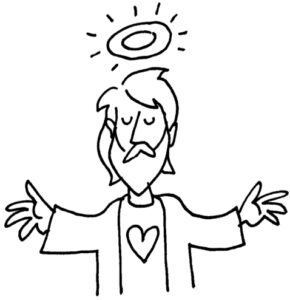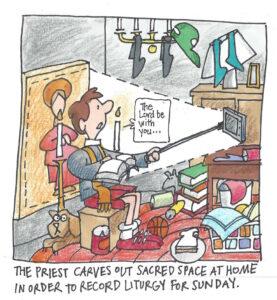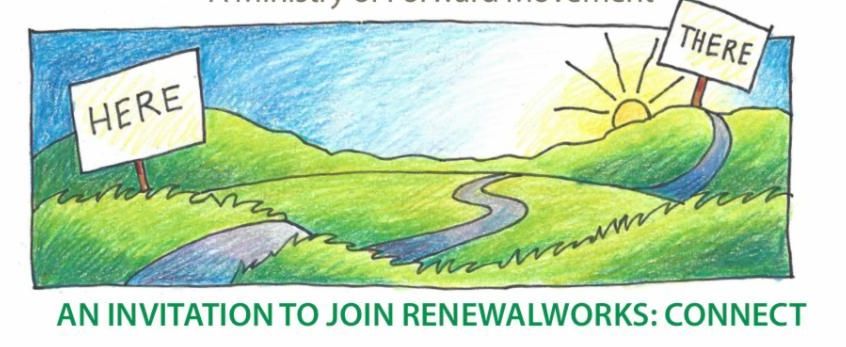In the past year, we’ve had to rethink and reconfigure a lot of the ways that we are the church. Probably many of you have navigated the sudden switch from meeting in-person to gathering virtually. With vaccines rolling out, hopefully you’re moving into something like a new normal and returning to your buildings. Although many things have changed about how we do church during this pandemic, some basic principles about vital churches have not.
What are these principles? And how can we apply best practices of spiritually vital churches to our congregations as we make our way into this new normal?
Based on our research and learnings from RenewalWorks, we offer some insight that might help you as you forge ahead. (Learn more about RenewalWorks in our digital brochure.)
The first step is to take the pulse of your congregation. How has your congregation changed over the past year? There are many obvious changes. You may stream your Sunday service online or meet via Zoom for small groups. But now is the time to assess how the events of the past year have impacted the spiritual life of your parishioners. For many people, times of crisis lead to deepened faith, but it can be hard to gauge where people are in their faith journeys.
The RenewalWorks process can help you take the pulse on the spiritual health of your parishioners. This information gathered by a Spiritual Life Inventory provides a starting point backed by data for charting your course forward. (And if you’ve done this process in the past, it might be a good time to do it again. You’ll learn a lot.) Contact us if you want more information about this Spiritual Life Inventory and how to get started.
The data we’ve gathered from congregations across the Episcopal Church has helped us understand the most effective practices for fostering spiritual vitality. Here are some things we’ve learned about these best practices that you might want to consider and implement right away:
1. Strengthen the heart of your leadership
Research shows that leaders make disciples by modeling discipleship. How has the pandemic impacted your own heart and the hearts of your congregation’s clergy and lay leaders? You’ve navigated a crisis. It might be time to check in with yourself and other leaders about whether or not you’re making personal spiritual growth a priority. Is it time for a retreat? For connecting with colleagues or a mentor? Is it time to get back to daily spiritual practices neglected during this past year? The leader’s heart is the critical element for spiritually vital congregations.
pandemic impacted your own heart and the hearts of your congregation’s clergy and lay leaders? You’ve navigated a crisis. It might be time to check in with yourself and other leaders about whether or not you’re making personal spiritual growth a priority. Is it time for a retreat? For connecting with colleagues or a mentor? Is it time to get back to daily spiritual practices neglected during this past year? The leader’s heart is the critical element for spiritually vital congregations.
2. Get people moving
Is spiritual growth an expectation in your congregation? Data we’ve gathered shows the importance of helping people understand that they are on a spiritual journey. In this moment, how can you create a path with clear next steps for wherever they are on that journey?
For Episcopalians, the eucharist is transformative. People have missed it terribly. Now would be a great time to teach about this central sacrament. You may have picked up newcomers to the Episcopal tradition who are unfamiliar with the liturgy. You may be welcoming back longtime church-goers who recognize how much they’ve missed the eucharist and want to know what it’s all about. Capitalize on this curiosity. An instructed eucharist is a great way to deepen understanding of the spiritual journey. Another helpful resource about Holy Eucharist is Furman Buchanan’s book, Gifts of God for the People of God.
At the same time, in the midst of the pandemic, many parishioners have explored new spiritual practices, discovering alternative ways of “being” church. Find out what has been meaningful for people in this unusual time. See how new practices can be incorporated in your common life. As you move forward, how will you mix online and in-person gatherings? Which practices should continue to be offered online regardless of pandemic restriction?
3. Embed scripture in everything you do
 According to research, the primary catalyst for spiritual growth is engagement in scripture. Whatever your future plans entail, scripture can be incorporated. It can be as simple as beginning meetings (even those about church business!) with 10 minutes of scripture reflection. It can mean launching a church-wide challenge to read a book of the Bible together to celebrate reunion. (The Good Book Club has archived resources that might help with facilitation). It can be offering study groups, online or in-person or some hybrid, to maximize engagement. Maybe you want to study Bible stories about time in the wilderness, or return from exile, circumstances not unlike coming out of the pandemic.
According to research, the primary catalyst for spiritual growth is engagement in scripture. Whatever your future plans entail, scripture can be incorporated. It can be as simple as beginning meetings (even those about church business!) with 10 minutes of scripture reflection. It can mean launching a church-wide challenge to read a book of the Bible together to celebrate reunion. (The Good Book Club has archived resources that might help with facilitation). It can be offering study groups, online or in-person or some hybrid, to maximize engagement. Maybe you want to study Bible stories about time in the wilderness, or return from exile, circumstances not unlike coming out of the pandemic.
4. Create a sense of ownership
Nearly 60% of Episcopalians indicate in the Spiritual Life Inventory say that they want to be challenged to grow and take next steps spiritually. A great way to help folks take ownership of their spiritual journeys is to teach and encourage practices such as daily quiet times in prayer and reflection on scripture. Keep offering the Daily Office online even when you can meet in person. We’ve heard from many churches that participation in midweek services has increased since they’ve offered the ability to participate via Facebook or other online platforms. Invite every parishioner to participate in My Way of Love, an individual inventory followed by eight weeks of emails that trace the Presiding Bishop’s Way of Love. It’s an easy way for people to shape a rule of life that can guide them.
5. Pastor your community
There’s been so much hurt over the past year. Spiritually vital congregations find ways to address the longings and losses of the community. How can your church provide comfort? Hold an interfaith liturgy of remembrance for your community. In addition to the pandemic, we are experiencing crises around racial reconciliation. How can your congregation discuss and learn about racial reconciliation? How can you invite the broader community into conversation?
Think about ways to support teachers and students, helping them make up for lost time and letting them know they are loved and appreciated. Economic need is great. Invite folks to support a food pantry or community vaccine clinic with time, talent, and treasure. Share a prayer or blessing when you give out a bag of food or vaccine.
and letting them know they are loved and appreciated. Economic need is great. Invite folks to support a food pantry or community vaccine clinic with time, talent, and treasure. Share a prayer or blessing when you give out a bag of food or vaccine.
The data on Episcopal churches has shown us that we excel in service but don’t always connect our faith to these acts of giving. Find tangible ways to connect the two. Spiritual growth happens when acts of service are anchored in the Baptismal Covenant, in prayer, and in scripture.
The mission of RenewalWorks is to help churches (and individuals in them) refocus on spiritual growth and identify ways that God is calling them to grow. Now is a great time to engage this process and chart the course forward. We would love to help you on that journey. Contact us if you would like to learn more about RenewalWorks, or if you have other thoughts and ideas about fostering spiritual growth as we emerge from the pandemic.





